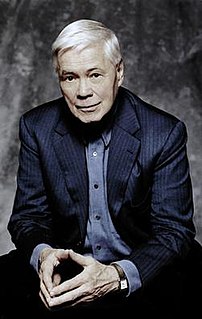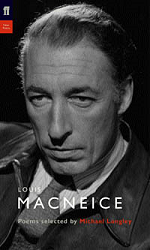A Quote by Dietrich Fischer-Dieskau
Toward the end of his life, one can sense that he was no longer thinking his way into the minds of others, causing them to speak on his behalf, but that he was now speaking for himself.
Related Quotes
Man—every man—is an end in himself, not a means to the ends of others; he must live for his own sake, neither sacrificing himself to others nor sacrificing others to himself; he must work for his rational self-interest, with the achievement of his own happiness as the highest moral purpose of his life.
When a warrior fights not for himself, but for his brothers, when his most passionately sought goal is neither glory nor his own life's preservation, but to spend his substance for them, his comrades, not to abandon them, not to prove unworthy of them, then his heart truly has achieved contempt for death, and with that he transcends himself and his actions touch the sublime. That is why the true warrior cannot speak of battle save to his brothers who have been there with him. The truth is too holy, too sacred, for words." -Suicide (Gates of Fire)
The Gospels record that nearly everywhere the Savior went, He was surrounded by multitudes of people. Some hoped that He would heal them; others came to hear Him speak. Others came for practical advice. Toward the end of His mortal ministry, some came to mock and ridicule Him and to clamor for His crucifixion.
A man who lies to himself, and believes his own lies becomes unable to recognize truth, either in himself or in anyone else, and he ends up losing respect for himself and for others. When he has no respect for anyone, he can no longer love, and, in order to divert himself, having no love in him, he yields to his impulses, indulges in the lowest forms of pleasure, and behaves in the end like an animal. And it all comes from lying - lying to others and to yourself.
Extreme narcissists exaggerate their achievements and talents, and so Trump has spent his life building up a false image of himself - not just for others, but for himself, to protect his deeply fragile ego. He lies endlessly, not just in the way sociopaths do, which is to con others, but also to delude himself.
All Mattia saw was a shadow moving toward him. He instinctively closed his eyes and then felt Alice’s hot mouth on his, her tears on his cheek, or maybe they weren’t hers, and finally her hands, so light, holding his head still and catching all his thoughts and imprisoning them there, in the space that no longer existed between them.
I believe that the unity of man as opposed to other living things derives from the fact that man is the conscious life of himself. Man is conscious of himself, of his future, which is
death, of his smallness, of his impotence; he is aware of others as others; man is in nature, subject to its laws even if he transcends it with his thought.
My personal attitude toward atheists is the same attitude that I have toward Christians, and would be governed by a very orthodox text: "By their fruits shall ye know them." I wouldn't judge a man by the presuppositions of his life, but only by the fruits of his life. And the fruits - the relevant fruits - are, I'd say, a sense of charity, a sense of proportion, a sense of justice. And whether the man is an atheist or a Christian, I would judge him by his fruits, and I have therefore many agnostic friends.
His face set in grim determination, Richard slogged ahead, his fingers reaching up to touch the tooth under his shirt. Loneliness, deeper than he had never known, sagged his shoulders. All his friends were lost to him. He knew now that his life was not his own. It belonged to his duty, to his task. He was the Seeker. Nothing more. Nothing less. Not his own man, but a pawn to be used by others. A tool, same as his sword, to help others, that they might have the life he had only glimpsed for a twinkling. He was no different from the dark things in the boundary. A bringer of death.
A teacher can never truly teach unless he is still learning himself. A lamp can never light another lamp unless it continues to burn its own flame. The teacher who has come to the end of his subject, who has no living traffic with his knowledge but merely repeats his lesson to his students, can only load their minds, he cannot quicken them.
At that instant he knew that all his doubts, even the impossibility of believing with his reason, of which he was aware in himself, did not in the least hinder his turning to God. All of that now floated out of his soul like dust. To whom was he to turn if not to Him in whose hands he felt himself, his soul, and his love?
Modern man has transformed himself into a commodity; he experiences his life energy as an investment with which he should make the highest profit, considering his position and the situation on the personality market. He is alienated from himself, from his fellow men and from nature. His main aim is profitable exchange of his skills, knowledge, and of himself, his "personality package" with others who are equally intent on a fair and profitable exchange. Life has no goal except the one to move, no principle except the one of fair exchange, no satisfaction except the one to consume.p97.
No man, however enslaved to his appetites, or hurried by his passions, can, while he preserves his intellects unimpaired, please himself with promoting the corruption of others. He whose merit has enlarged his influence would surely wish to exert it for the benefit of mankind. Yet such will be the effect of his reputation, while he suffers himself to indulge in any favourite fault, that they who have no hope to reach his excellence will catch at his failings, and his virtues will be cited to justify the copiers of his vices.



































